Top Selenium Alternatives for Test Automation in 2025
Written by: Hrishikesh Pardeshi, Founder at Flexiple, buildd & Remote Tools.
Last updated: Feb 25, 2025
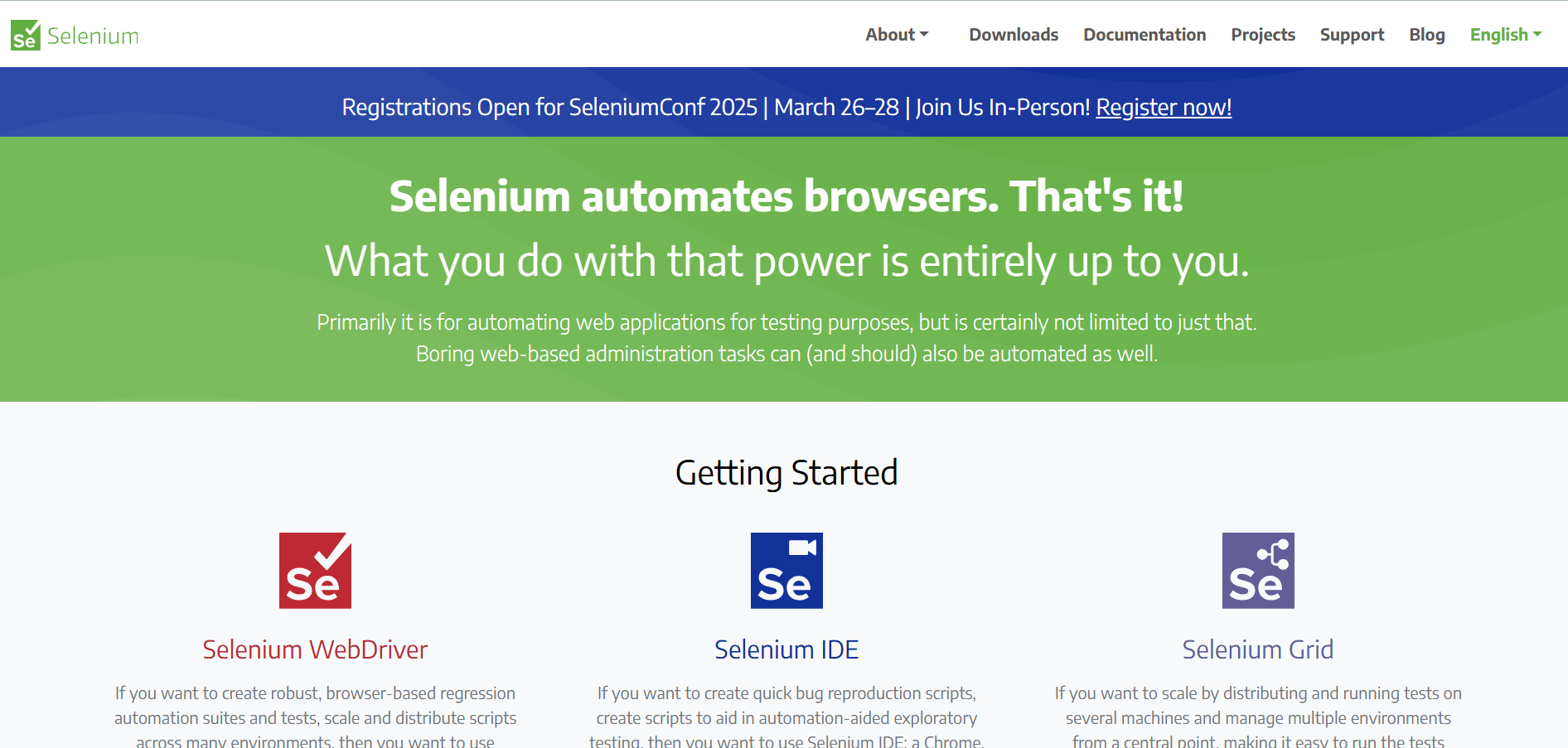
Best Selenium alternatives in 2025 are:
Cypress
Playwright
TestCafe
Puppeteer
Katalon Studio
Appium
Ranorex
Ghost Inspector
In the fast-paced world of test automation, choosing the right tool can make a big difference in how efficient and effective your testing process is. If you're looking for modern features such as detailed tracing capabilities, easier setup, better cross-browser support than what Selenium provides, or the ability to handle multiple browsers and multiple tests simultaneously, the alternatives below offer a range of options. This guide compares the top Selenium alternatives, focusing on their test maintenance and test scripts capabilities, to help you find the best fit for your testing needs.
Table of Contents
Why Do You Need Alternatives to Selenium?
Selenium has been a dominant tool for web test automation for years, but its limitations—such as complex setup, slower execution in certain scenarios, and maintenance challenges—can affect productivity. Alternatives to Selenium often provide modern architectures, improved debugging capabilities, and enhanced integration with contemporary development and CI/CD environments. Evaluating these options can help you adopt the best automation tool that better meets your team’s performance, scalability, and usability requirements. When exploring alternatives, consider those that support behavior driven development and offer scripting language flexibility, enabling you to create tests more effectively.
Who Should Consider Using Selenium Alternatives?
Organizations and teams facing specific challenges with Selenium can benefit from exploring alternative tools. Whether you are a QA engineer seeking faster test execution, a developer looking for seamless integration with modern CI/CD pipelines, an enterprise in need of scalable testing solutions, or a startup wanting a user-friendly and low-maintenance tool, there is an option tailored to your requirements.
QA Engineers and Testers Seeking Modern Automation
For testers and QA professionals who require more intuitive interfaces, real-time debugging, and advanced reporting features, several alternatives provide a more modern approach to automation than Selenium.
Developers Requiring Robust Test Automation Integration
Developers looking for tools that integrate easily with modern development workflows and support cross-browser and cross-platform testing will find that many Selenium alternatives offer robust APIs and seamless CI/CD integration.
Enterprises Needing Scalable Testing Solutions
Large organizations that need to run extensive test suites across multiple environments can benefit from tools that offer scalability, parallel execution, and comprehensive test management features.
Startups and Agile Teams Looking for User-Friendly Tools
For startups and agile teams that want to reduce setup complexity and maintenance overhead, several alternatives offer straightforward installation, intuitive design, and quick time-to-value.
When evaluating selenium alternatives for your testing needs, consider checking out our in-depth review on Docker alternatives, which highlights scalable solutions for your automation challenges.
Selenium Alternatives Comparison Table
| Feature | Cypress | Playwright | TestCafe | Puppeteer | Katalon Studio | Appium | Ranorex | Ghost Inspector |
|---|---|---|---|---|---|---|---|---|
| Ease of Use | Easy | Easy | Easy | Moderate | Moderate | Moderate | Easy | Very Easy |
| Pricing | Free & Paid Plans | Free (Open Source) | Free & Paid Plans | Free (Open Source) | Free & Paid Plans | Free (Open Source) | Paid | Paid |
| Platform Support | Browser-based | Browser & Mobile | Browser-based | Browser-based | Desktop & Web | Mobile & Web | Desktop & Web | Cloud-based |
| Test Automation Features | Extensive real-time reloading | Cross-browser & multi-language | No WebDriver dependency | Headless Chrome automation | Integrated test management | Mobile test automation | Codeless GUI testing | Record & playback testing |
| Special Features | Time-travel debugging | Automated multi-browser testing | Built-in parallel test execution | Rich API for browser control | All-in-one automation solution | Support for native mobile apps | Robust object recognition | Cloud-based test scheduling |
Best Selenium Alternatives
Choosing the right automation tool can dramatically improve the speed and reliability of your testing processes. The alternatives below have been selected for their innovative features, ease of integration, and overall performance in test automation. Whether you are a tester, developer, or enterprise looking for scalable solutions, these tools offer compelling benefits compared to Selenium.
1. Cypress
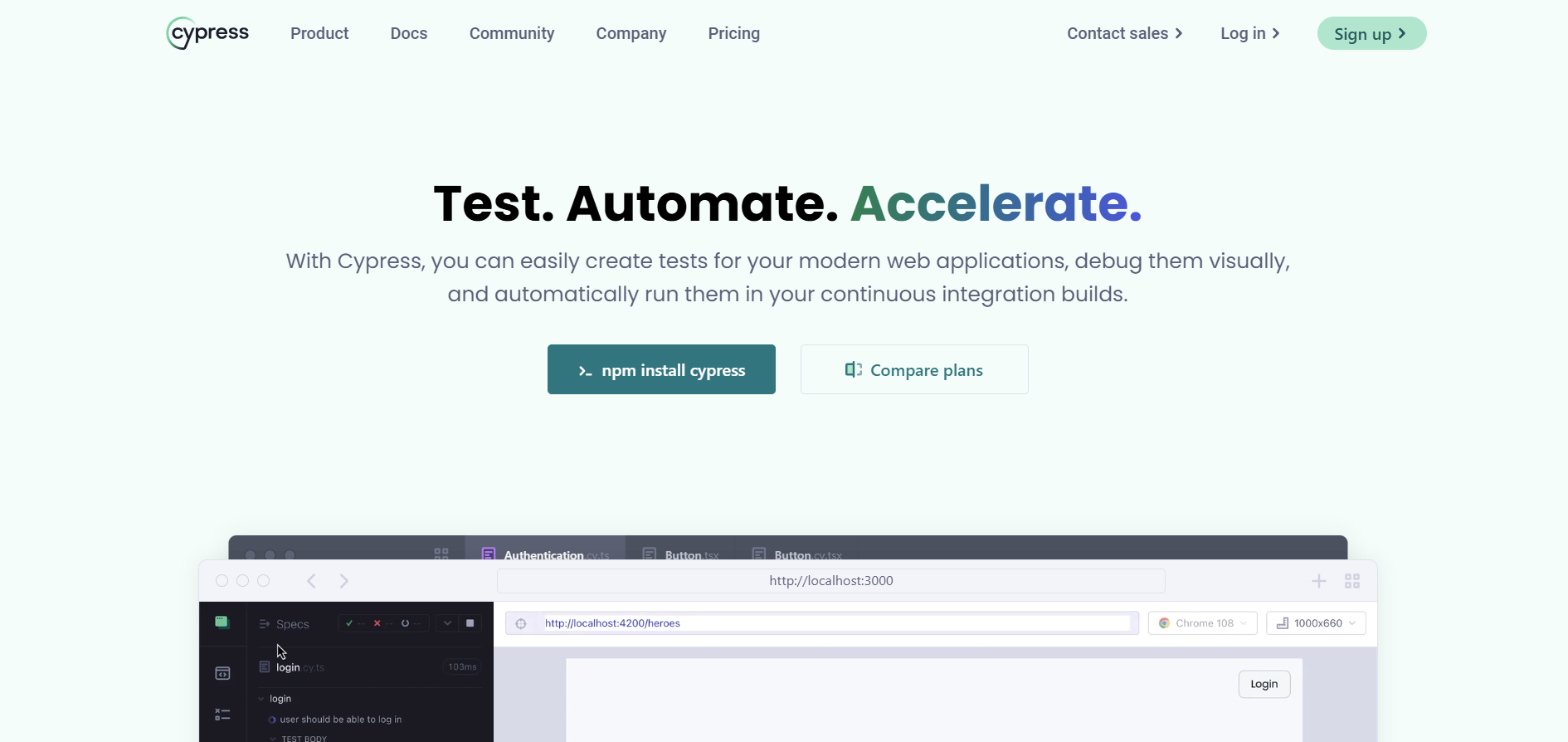
Cypress is a modern, developer-friendly test automation framework that provides fast, reliable testing for web applications. Designed to run directly in the browser, Cypress offers real-time reloading, interactive debugging, and an intuitive interface that simplifies the testing process.
Cypress vs Selenium
Cypress is built from the ground up for modern web applications and offers an easier setup with faster execution times than Selenium. Its real-time reloading and interactive debugging capabilities provide a smoother development experience.
Key Features of Cypress
Real-time reloading and time-travel debugging
Automatic waiting and asynchronous testing
Built-in support for Mocha and Chai
Interactive GUI for test visualization
Extensive documentation and active community
Cypress Pros
Simplified setup and configuration
Fast test execution
Intuitive and developer-friendly interface
Excellent real-time debugging tools
Strong community support
Cypress Cons
Limited support for multi-tab and multi-origin testing
Primarily focused on JavaScript applications
Not ideal for testing mobile applications
Limited support for cross-browser testing (though improving)
Cypress Pricing
Cypress offers a range of plans for its cloud-based testing platform:
Starter Plan: Free, includes up to 50 users, 500 test results per month, and 30 days of data retention. This plan is ideal for small teams or individual developers.
Team Plan: Costs $67 per month (billed annually at $799). It includes 50 users, 120,000 test results annually, 90 days of data retention, and premium support.
Business Plan: Priced at $267 per month (billed annually at $3,199), it offers the same number of test results and users as the Team Plan but adds advanced features like Smart Orchestration and extended support.
Enterprise Plan: Custom pricing based on organizational needs. This plan includes unlimited users, custom test result limits, 180 days of data retention, and additional enterprise-grade features such as SSO and advanced analytics.
Additional test results can be purchased on-demand at $6 per 1,000 results for the Team Plan and $5 per 1,000 results for the Business Plan. Cypress also offers optional add-ons like UI Coverage and Accessibility tools.
2. Playwright
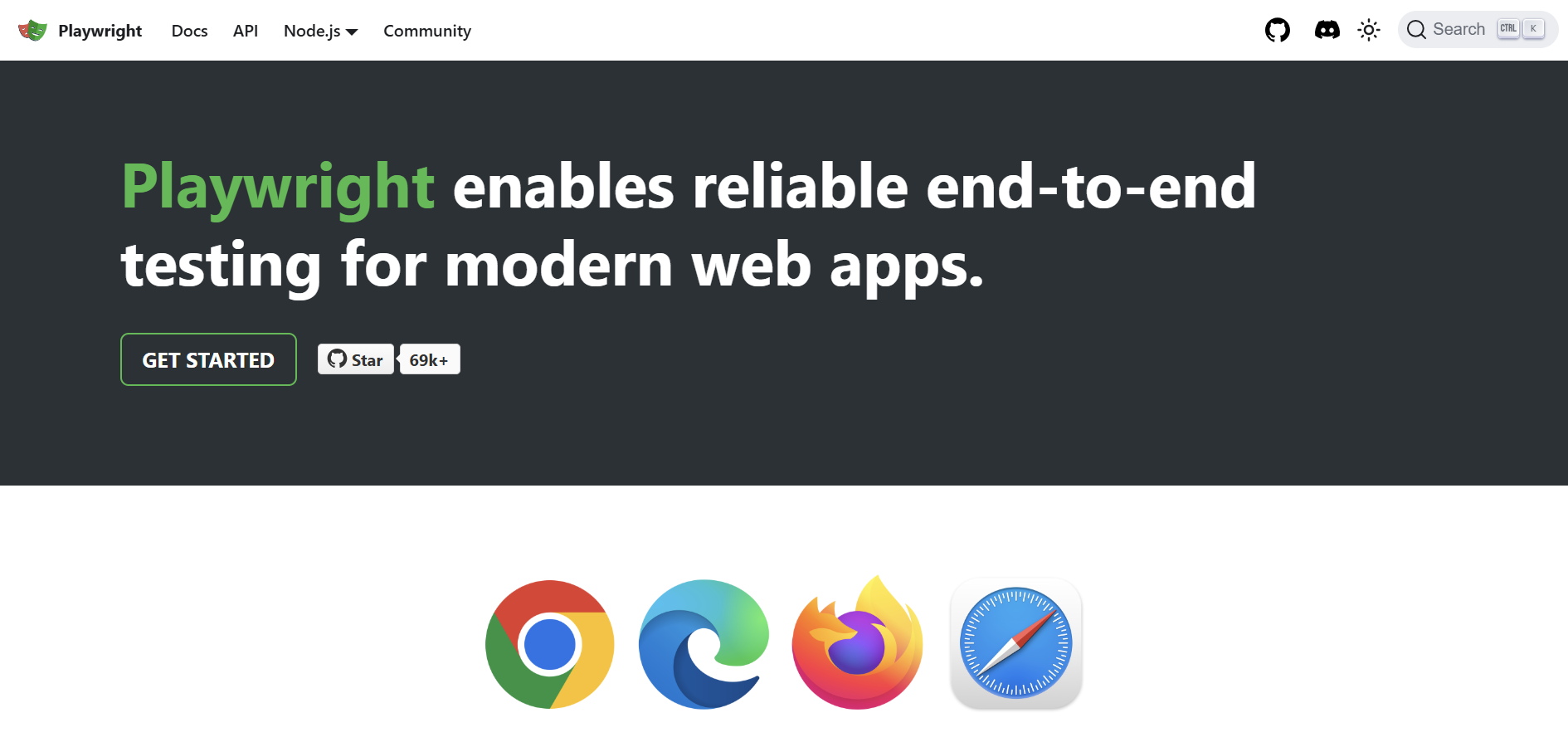
Playwright is an open-source automation framework developed by Microsoft that enables reliable end-to-end testing for modern web applications. It supports multiple browsers and platforms and allows testers to write tests in various languages such as JavaScript, Python, and C#.
Playwright vs Selenium
Playwright offers robust cross-browser testing with built-in support for Chromium, Firefox, and WebKit. Its multi-language support and modern API design provide a more seamless testing experience compared to Selenium’s older architecture.
Key Features of Playwright
Cross-browser automation (Chromium, Firefox, WebKit)
Multi-language support
Auto-waiting and smart assertion handling
Network interception and request/response control
Parallel test execution and detailed trace viewer
Playwright Pros
Excellent cross-browser support
Supports multiple programming languages
Modern, robust API design
Fast and reliable test execution
Active community and frequent updates
Playwright Cons
Relatively new, with evolving best practices
Steeper learning curve for beginners
Limited integrations compared to Selenium’s extensive ecosystem
Playwright Pricing
Playwright is an open-source testing framework that is free to use for all its core features. However, Microsoft offers a paid service called Microsoft Playwright Testing through Azure for enhanced capabilities:
Pricing is based on "test minutes," which represent the total runtime of tests in cloud-hosted browsers. Costs vary depending on whether tests are run on Linux or Windows environments.
The service allows users to pay-as-you-go with no upfront costs. A free trial includes the first 100 test minutes and 1,000 test results within a 30-day period.
For exact pricing details tailored to your usage, Microsoft provides an Azure pricing calculator or custom quotes through their sales team.
3. TestCafe
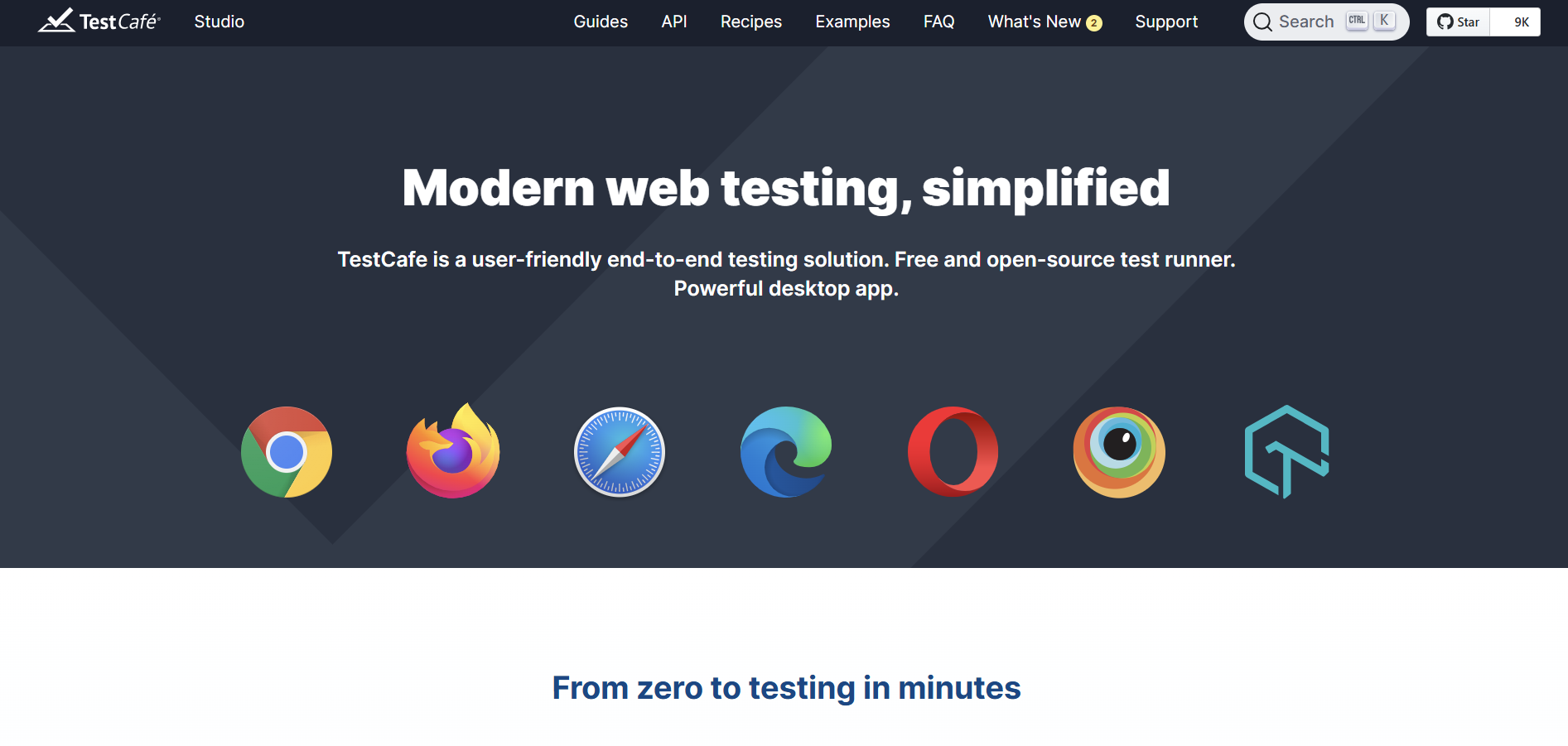
TestCafe is an easy-to-use end-to-end testing framework that does not rely on WebDriver. It allows testers to write tests in JavaScript or TypeScript and is known for its simple setup and powerful out-of-the-box features.
TestCafe vs Selenium
TestCafe eliminates the need for WebDriver, which simplifies the setup and reduces flakiness. Its integrated parallel test execution and automatic waiting make it a streamlined alternative to Selenium.
Key Features of TestCafe
No WebDriver dependency
Built-in parallel test execution
Automatic waiting and smart test retries
Support for modern JavaScript and TypeScript
Detailed reports and live test monitoring
TestCafe Pros
Easy installation and configuration
Fast and reliable test execution
Simplified API for writing tests
Great for continuous integration environments
Rich reporting and debugging tools
TestCafe Cons
Limited support for mobile testing
Smaller community compared to Selenium
Fewer integrations with some legacy tools
May require adjustments for very complex test scenarios
TestCafe Pricing
TestCafe offers two pricing models: an open-source version and a commercial product called TestCafe Studio. The open-source version of TestCafe is entirely free to use, making it an excellent cost-effective solution for individuals and teams looking for basic automated web testing features. It includes cross-browser support, real-time reporting, and a built-in assertion library, which is sufficient for many testing needs.
For users requiring advanced features, TestCafe Studio is available as a commercial product. It is priced starting at $244.99 per user (one-time purchase) and includes additional capabilities such as a visual test creation environment, advanced debugging tools, built-in test reporting, and support for mobile device testing. Subscription renewals for updates and support are optional and cost $97.99 per year for a single user. Discounts are available for bulk licenses, with prices decreasing to $207.49 per user for quantities of 11 or more.
4. Puppeteer
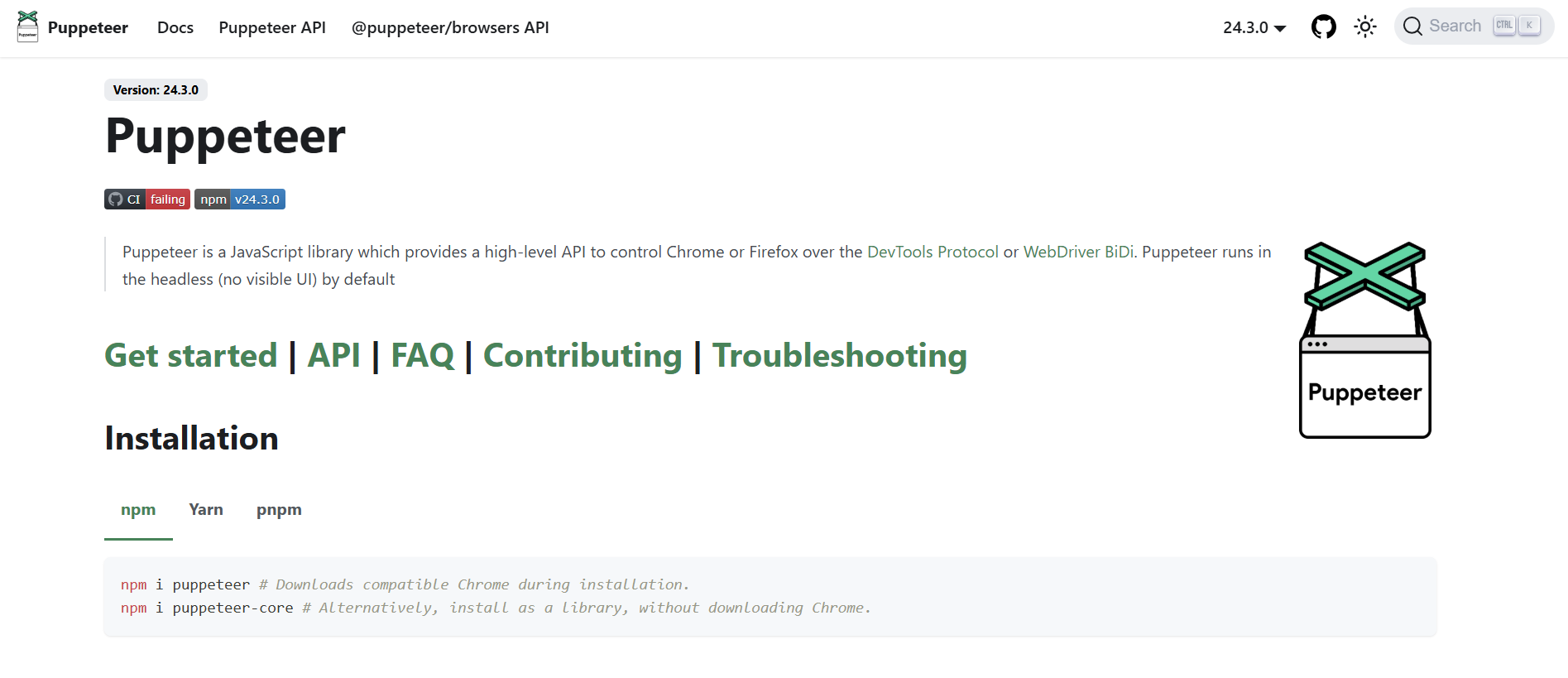
Puppeteer is a Node.js library developed by Google that provides a high-level API to control headless Chrome or Chromium. It’s ideal for generating PDFs, capturing screenshots, and automating form submissions.
Puppeteer vs Selenium
Puppeteer is designed specifically for Chrome/Chromium and offers a simpler API for headless browser automation. Its focus on performance and ease of use makes it a strong alternative to Selenium for tasks that require browser control without the overhead of a full WebDriver.
Key Features of Puppeteer
Headless Chrome/Chromium automation
Easy screenshot and PDF generation
Powerful API for DOM manipulation
Fast execution and simple setup
Excellent for web scraping and performance testing
Puppeteer Pros
Lightweight and fast
Simple and intuitive API
Excellent for headless browser tasks
Well-maintained by Google
Ideal for web scraping and performance monitoring
Puppeteer Cons
Limited to Chrome/Chromium only
Not designed for cross-browser testing
Fewer built-in test assertions
Requires additional libraries for complex test scenarios
Puppeteer Pricing
Puppeteer is an open-source Node.js library that is completely free to use, providing a high-level API for controlling Chrome or Chromium browsers. However, if you want to run Puppeteer in a cloud environment, costs depend on the platform. For example, deploying Puppeteer on AWS EC2 instances starts at $0.022/hour (Ubuntu) or $0.029/hour (Windows), with additional storage fees.
AWS Lambda offers Puppeteer as a service for $19/month plus infrastructure costs. Additionally, commercial services like Puppeteer.ai provide advanced features starting at $500/month for API access and integrations, with higher-tier plans offering analytics and dedicated support. While Puppeteer itself is free, cloud deployment or commercial services can incur extra costs based on usage and requirements.
5. Katalon Studio
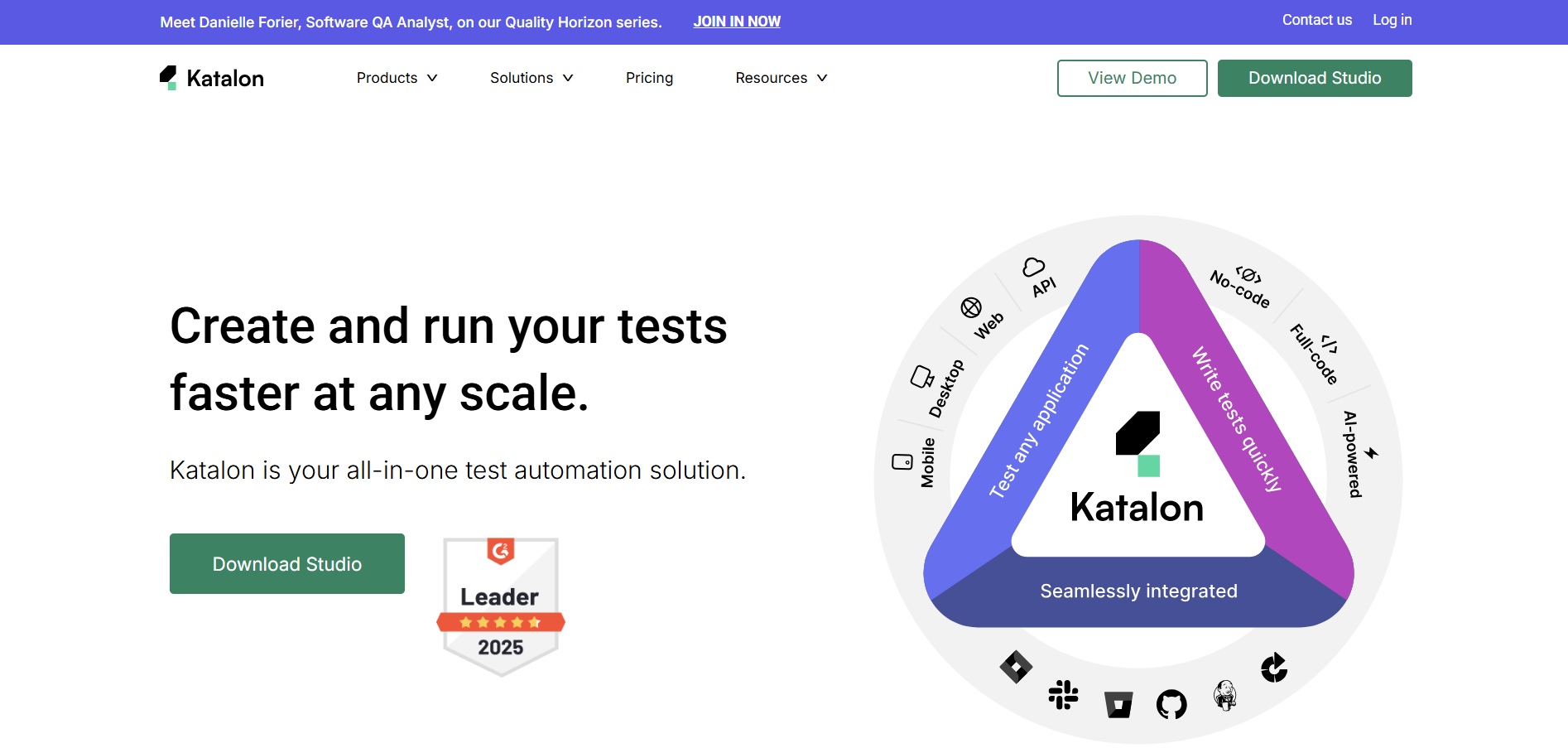
Katalon Studio is an all-in-one test automation solution that supports web, API, mobile, and desktop testing. It provides a comprehensive IDE with a low-code approach, making it accessible for both technical and non-technical users.
Katalon Studio vs Selenium
Katalon Studio offers an integrated environment with built-in features for test case management, reporting, and execution, reducing the need for additional integrations. Its low-code approach makes test automation more accessible compared to Selenium’s code-intensive setup.
Key Features of Katalon Studio
Integrated test automation IDE
Supports web, mobile, API, and desktop testing
Built-in record and playback functionality
Comprehensive reporting and analytics
Supports both scripting and low-code test creation
Katalon Studio Pros
User-friendly with a low-code interface
Comprehensive testing across multiple platforms
Rich built-in features and integrations
Extensive documentation and community support
Ideal for teams with varied technical expertise
Katalon Studio Cons
Requires a learning period for advanced features
The free version has limitations on concurrent executions
May be resource-intensive on lower-end machines
Licensing cost for advanced enterprise features
Katalon Studio Pricing
Katalon Studio offers both free and paid plans to cater to different testing needs. The Free Plan provides basic features for test creation and execution, making it ideal for individuals or small teams. For advanced capabilities, the Studio Enterprise Plan starts at $69 per month (node-locked license) or $1,529 per year (floating license), offering features like advanced analytics, AI-powered testing, and enterprise-grade support.
Additionally, the Runtime Engine is available for $54 per month to enable CI/CD pipeline integration and command-line execution. Discounts are available for annual subscriptions, and custom pricing is offered for enterprise-scale deployments with on-premise or private SaaS configurations. A free trial is also available for users to explore premium features before committing.
6. Appium
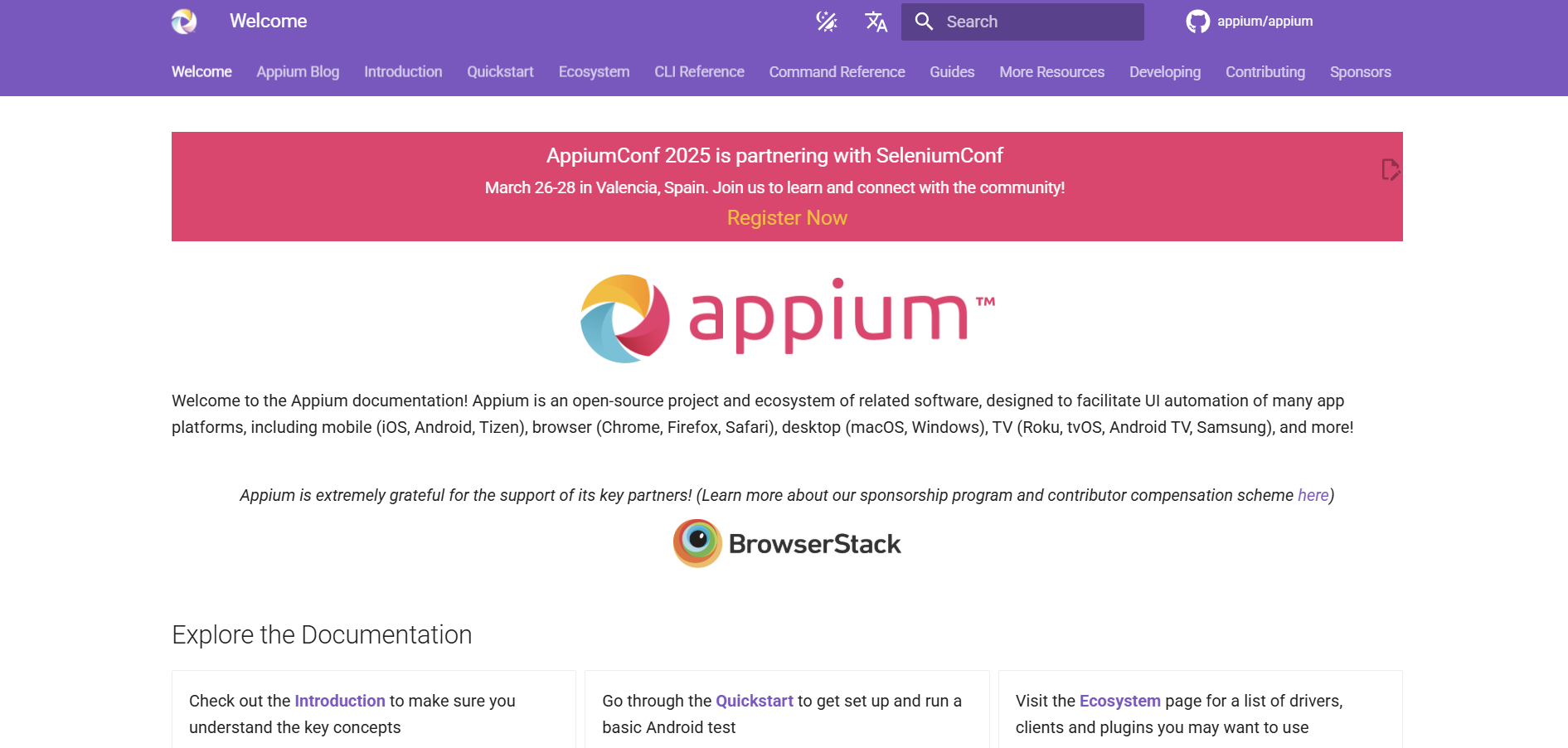
Appium is an open-source tool for automating native, mobile web, and hybrid applications on iOS and Android platforms. It uses the WebDriver protocol and supports multiple programming languages, making it versatile for mobile test automation.
Appium vs Selenium
While Selenium is primarily used for web automation, Appium extends the same principles to mobile platforms. It provides a unified API to automate tests across different mobile devices, offering greater flexibility for mobile application testing.
Key Features of Appium
Supports native, mobile web, and hybrid apps
Multi-platform support for iOS and Android
Uses the WebDriver protocol
Supports multiple programming languages
Extensive community and plugin ecosystem
Appium Pros
Open source and free to use
Flexible and language-agnostic
Supports real devices and emulators
Seamless integration with CI/CD pipelines
Large community and continuous updates
Appium Cons
Can have a steep learning curve for mobile-specific challenges
Requires device-specific configurations
Performance may vary across devices
Debugging issues can be complex
Limited out-of-the-box reporting features
Appium Pricing
Appium is an open-source mobile test automation tool that is completely free to use. It supports testing for native, hybrid, and mobile web applications across platforms like iOS, Android, and Windows. Since it is open source, there are no licensing or subscription costs associated with Appium.
However, some third-party services or tools built on top of Appium may charge for additional features or cloud-based testing environments. For organizations with technical expertise, Appium provides a cost-effective solution for mobile automation without direct pricing tiers.
7. Ranorex
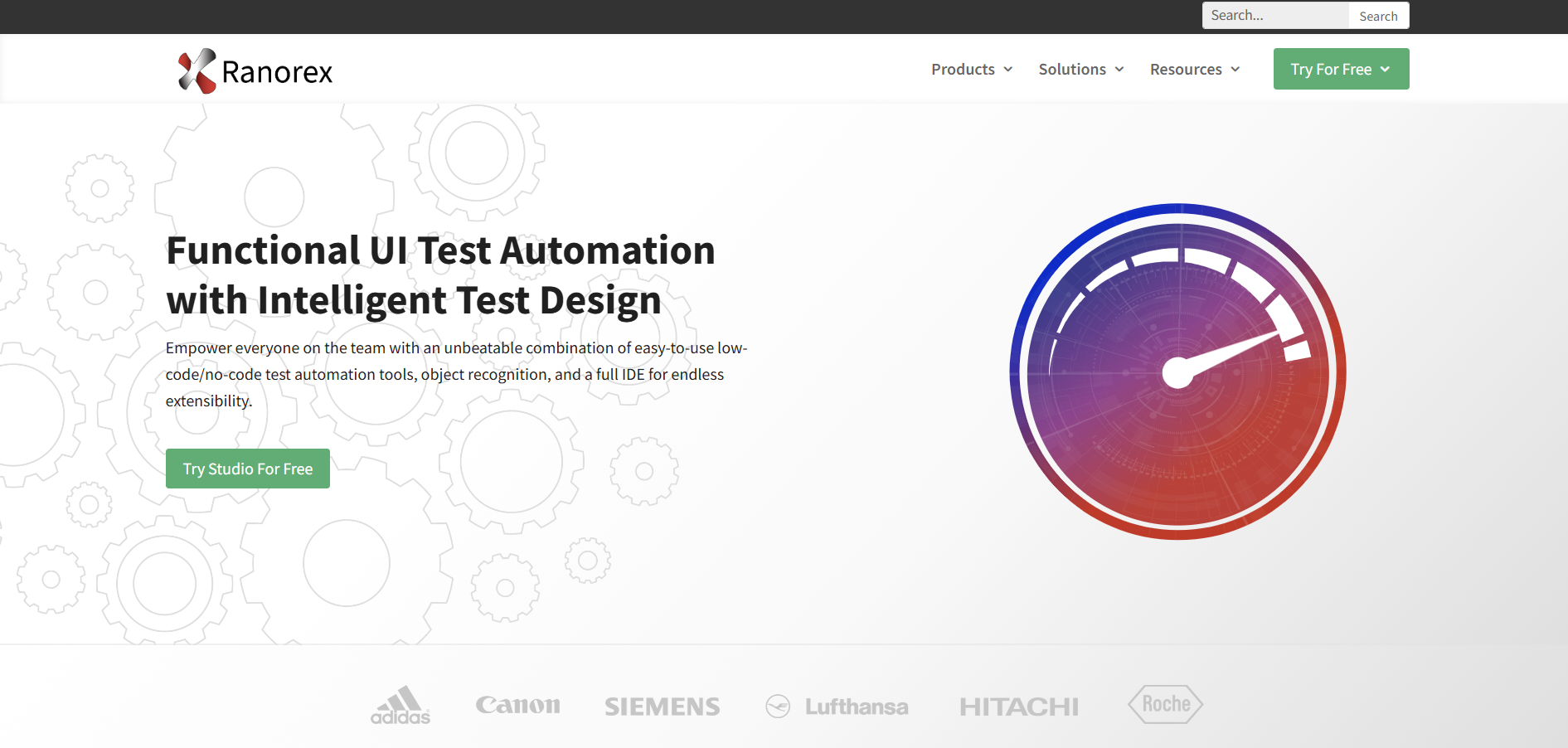
Ranorex is a commercial test automation tool known for its powerful GUI recognition and codeless test automation capabilities. It supports desktop, web, and mobile applications and is designed to simplify the creation and maintenance of automated tests.
Ranorex vs Selenium
Ranorex provides a user-friendly, codeless interface along with advanced GUI recognition features that reduce maintenance overhead. Unlike Selenium, which requires more programming expertise, Ranorex is designed to enable both technical and non-technical users to create robust automated tests.
Key Features of Ranorex
Codeless test automation with record-and-playback
Advanced GUI object recognition
Supports desktop, web, and mobile testing
Integrated reporting and analytics
Seamless integration with CI/CD tools
Ranorex Pros
Easy for non-developers to use
Robust object recognition reduces flakiness
Comprehensive support for multiple platforms
Powerful reporting and analytics
Extensive technical support and training resources
Ranorex Cons
Commercial licensing can be expensive
Limited customization compared to open-source tools
May require additional training for advanced features
Not as flexible for complex scripting needs
Primarily designed for larger enterprises
Ranorex Pricing
Ranorex Studio offers perpetual licensing with three main pricing tiers. The Runtime License costs $980 per additional endpoint and is designed for executing tests created on other licenses.
The Premium Node-Locked License is priced at $2,990 per installation, suitable for single-user setups. For teams requiring flexibility, the Premium Floating License costs $4,990 per concurrent user and allows sharing across multiple machines.
All licenses include 12 months of software maintenance and email support, with renewals available for ongoing updates. A free trial is also offered to explore its features before purchase.
8. Ghost Inspector
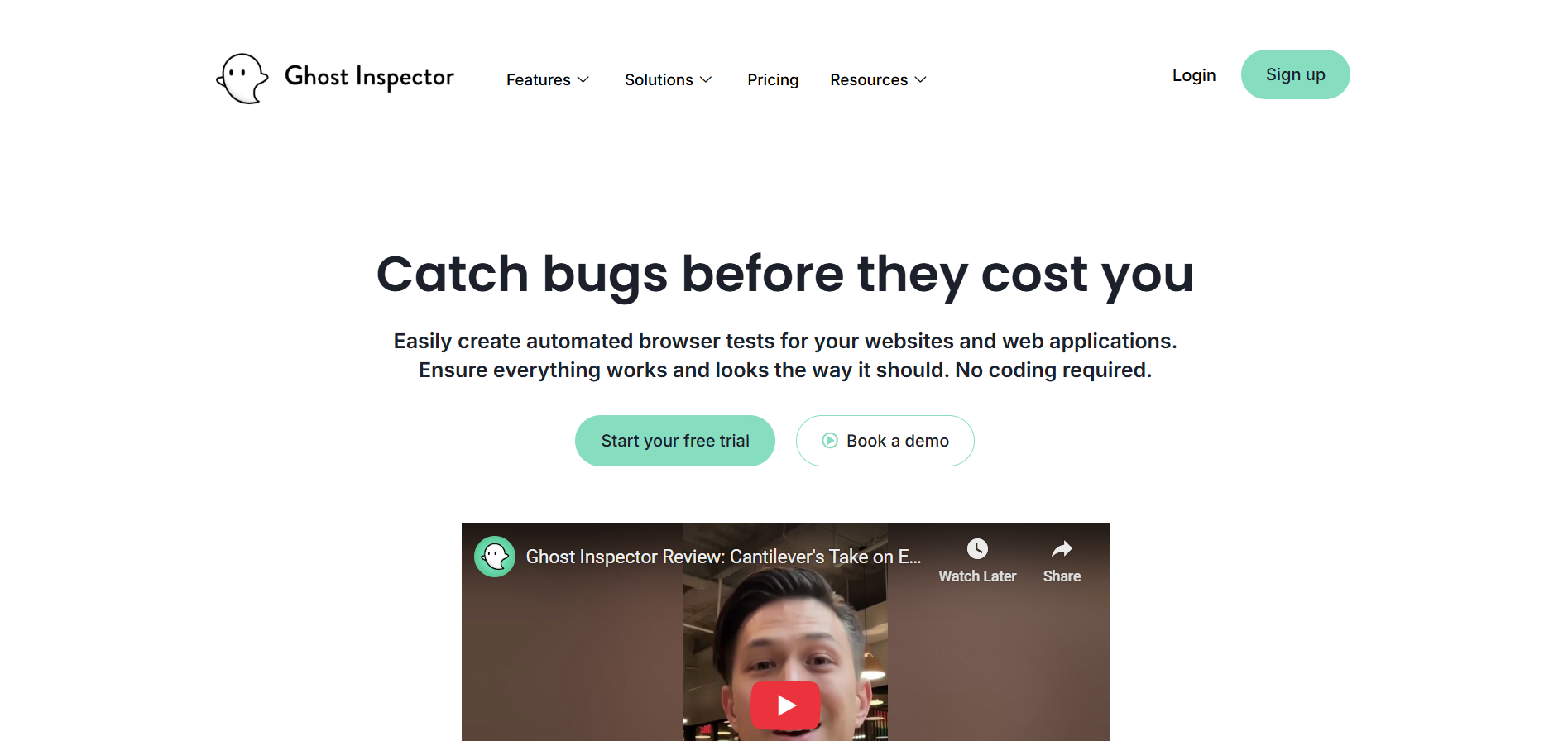
Ghost Inspector is a cloud-based test automation platform that emphasizes ease of use through record-and-playback capabilities. It is designed for quick test creation, maintenance, and execution without requiring extensive coding knowledge.
Ghost Inspector vs Selenium
Ghost Inspector offers a cloud-based, user-friendly approach to test automation, with a strong focus on record-and-playback functionality. Unlike Selenium, which can involve complex setup and coding, Ghost Inspector enables teams to create and execute tests quickly and efficiently with minimal technical overhead.
Key Features of Ghost Inspector
Cloud-based record-and-playback testing
Automated browser testing across multiple environments
Easy integration with CI/CD pipelines
Visual test editor with minimal coding
Comprehensive reporting and scheduling features
Ghost Inspector Pros
Extremely user-friendly with minimal setup
Fast test creation using record-and-playback
Cloud-based execution reduces maintenance overhead
Great for non-technical users and small teams
Reliable integrations with popular tools
Ghost Inspector Cons
Primarily designed for basic test scenarios
Limited flexibility for highly complex tests
Subscription costs may add up for large test suites
Fewer customization options compared to open-source tools
Dependent on a stable internet connection
Ghost Inspector Pricing
Ghost Inspector offers flexible subscription-based pricing plans tailored to different team sizes and testing needs.
Pricing starts at $109 per month for the Small Plan, which includes 10,000 test runs per month and supports up to 5 team members. The Standard Plan costs $208 per month, offering 30,000 test runs and 15 team members.
Higher-tier plans, such as the Business Plan at $499 per month, provide 100,000 test runs and support for 50 team members. Enterprise customers can request custom pricing for unlimited test runs, advanced features, and priority support. All plans include unlimited parallel testing and integrations with tools like Slack, Jira, and GitHub. Ghost Inspector also offers a free 14-day trial with full access to premium features.
FAQs on Selenium Alternatives
1. What are the top alternatives to Selenium?
The top alternatives to Selenium include Cypress, Playwright, TestCafe, Puppeteer, Katalon Studio, Appium, Ranorex, and Ghost Inspector. Each of these tools offers unique features and benefits tailored to different testing needs.
2. Why should I consider using an alternative to Selenium?
You should consider an alternative to Selenium if you need faster test execution, simpler setup and maintenance, improved cross-browser support, or specialized features such as record-and-playback functionality and mobile testing support.
3. Are Selenium alternatives free to use?
Some alternatives, like Playwright, Puppeteer, and Appium, are completely free and open source. Others, such as Cypress and TestCafe, offer free versions along with premium plans, while commercial tools like Ranorex and Ghost Inspector require a paid license.
4. Which Selenium alternative is best for comprehensive test automation?
The best alternative depends on your specific needs. For a modern, developer-friendly experience, Cypress or Playwright are excellent choices. If you require a low-code solution for non-technical users, Katalon Studio or Ranorex may be more suitable.
5. Can these alternatives integrate with CI/CD pipelines?
Yes, most Selenium alternatives provide seamless integration with popular CI/CD tools, enabling automated test execution as part of your development workflow.